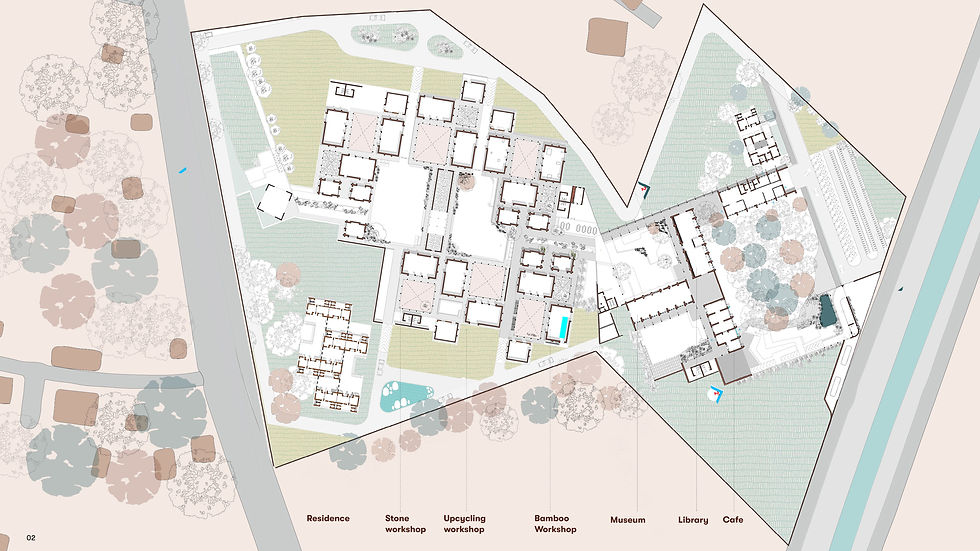
BUILDING CRAFT CENTRE
A craft center in Orissa focusing on upskilling artisans and the practice of craft in the Indian Building Industry. The project allowed for in- depth knowledge of construction processes and material research.
Project type: Architecture thesis
Role: Individual project
Year: 2019-2020

India is an invaluable repository of traditional building practices, practiced by skilled artisans that emerge as a response to its diverse climatic, geological and socio-cultural expressions. This vast resource of building practices and skilled artisans is continuously being threatened by the unprecedented growth of the construction industry and the quest for a ‘modern’ and/ or ‘permanent’ habitat. Many indigenous building approaches and artisanal communities are losing their relevance and are being rapidly reduced to being labour as opposed to being craftsmen, ultimately proving unsustainable, both economically as well as ecologically. While substantial research on traditional building materials and techniques exists and is ongoing, its implementation, specifically for contemporary development, is often contested.
The thesis attempts to look for ways in which craftsmen can be empowered with the industry through upskilling, find out ways to produce architectural spaces combining the indigenous building practices with the contemporary, for modern needs.
UNDERSTANDING CONTEXT
Studying the context of the town I was designing for gave an insight into the local building practices , material usage, space planning and cultural context. The following study also helped understand the climate responsive strategies that needed to be considered in a state like Orissa.


Rapid sketching to derive key design elements to incorporate in the campus
A glossary of design elements were developed during initial sketching sessions.
A central semi open workshop area
Workshop module configurations
Façade details and landscape elements


-
Lack of research , efforts in documentation, upgradation and upskilling artisans in the state.
-
New proposal of Odisha Skill Development plan (OSDP) and the indigenous peoples plan, on which the project proposal is based.
-
Initiatives like the Artisans self help group to give impetuous to the training of craftsman in the industry to form corporations thereby helping the artisans in the state
WHY ORISSA ?


DESIGN PROTOTYPES
workshop area
Design studio
Library
To understand the role and the participation of the craftsman in the industry, I compared the contemporary construction industry with the indigenous. It was clear, that though the indigenous construction was organic it worked well with the Indian conditions of diversity, diverse contexts and kept the artisan at the center of the ecosystem
After studying the settlements three main materials found abundant in orissa were identified. Earth, bamboo, stone, and building waste as a material were studied.
A detailed material study was conducted to understand
The knowledge necessary for an artisans capacity building. 3 key themes derived from this study
Raw material and procurement
Tools and equipment required
Building process
A basic unit o workshops, storage, and design studio was developed.
After studying the settlements three main materials found abundant in orissa were identified. Earth, bamboo, stone, and building waste as a material were studied.
A detailed material study was conducted to understand the knowledge necessary for an artisans capacity building. 3 key themes derived from this study
-
Raw material and procurement
-
Tools and equipment required
-
Building process
A basic unit of workshops, storage, and design studio was developed.















